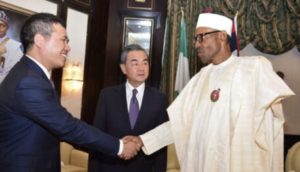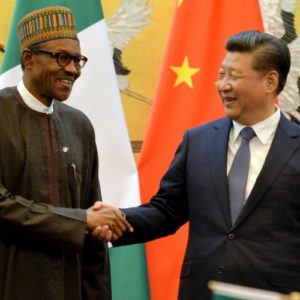By Owei Lakemfa
In contrast, China, from October 1, 1949, under the leadership of Mao Tse Tung, set off on a different trajectory, rejecting the teachings of the former colonialists in favour of those of its own ancient civilisations, philosophers and language. China never forgot the atrocities of the West, which had fought two wars against it just to force the Chinese to accept opium, not just as a major item of trade but one that must be taken in daily doses across the country.
China and all but two of the 55 African countries were enslaved by European colonialists, who looted them and carried out unspeakable atrocities, including the massacre of millions. Even after independence, they were subjected to control by their former slave masters who taught them that they could develop only on the basis of a Western model and ideology.

Africa followed this like a religion, and a handle full of African leaders who disagreed, like Felix Moumie of Cameroun, Kwame Nkrumah of Ghana and Ahmed Sekou Toure of Guinea were killed, overthrown or severely punished by the former colonial masters and their allies. The rest of Africa accepted the religion of the colonialists, who taught that there shall be no other gods but themselves. Subsequently, Africa has almost become a basket case.
In contrast, China, from October 1, 1949, under the leadership of Mao Tse Tung, set off on a different trajectory, rejecting the teachings of the former colonialists in favour of those of its own ancient civilisations, philosophers and language. China never forgot the atrocities of the West, which had fought two wars against it just to force the Chinese to accept opium, not just as a major item of trade but one that must be taken in daily doses across the country.
China was convinced that the way of the enslaver would not lead to development. So it experimented with the ideas of Karl Marx and Vladimir Lenin. It rejected all the basic teachings of the West, including allowing ‘Market Forces’ to determine its economy and currency. Today, China does not just feed, clothe and house its 1.4 billion people, but has within four decades lifted about 800 million Chinese out of poverty and become the second largest economy in the world.
In 2000, China reached out to African countries to formalise their South-South cooperation outside Western influence. Hence was born a score years ago, the Forum On China-Africa Cooperation (FOCAC). The first ministerial meeting was held in Beijing from October 10-12, 2000, preparatory to its Heads of State Summit.
Some of the African leaders at the maiden summit, like Togo’s Gnassingbe Eyadema, Tanzania’s Benjamin Mkapa, Zambia’s Frederick Chiluba and Algeria’s Abdelaziz Bouteflika have passed away. However, the FOCAC seems not just alive, but thriving. It is this that is being examined critically to determine its success or otherwise and how it might perform in the next twenty years.
First, it is important to state that China-Africa relations preceded FOCAC. In fact, both have had direct contacts by sea since the Seventh Century. In more contemporary times, African countries like Guinea, Algeria, Morocco, Egypt, Somalia and Sudan signed bilateral agreements with China in the late 1950s.
However, the FOCAC–like cooperation began in the late 1960s. Northern Rhodesia had snatched its independence on October 24, 1964 and renamed itself Zambia. Its founding President Kenneth Kaunda has a beautiful book on this struggle titled Zambia Shall Be Free. But Zambia, being a landlocked country having to rely on the ports of Apartheid South Africa, could in reality not be free unless it broke its chains with the Apartheid regime.
A viable way out was to use the ports of Tanzania. But a railway was needed to transport the Zambian goods cheaply and safely, as the Tanzanian ports were some 1,860 kilometres away. Both countries approached the capitalist Western European countries, the socialist Eastern European countries, the United States and bodies like the World Bank. None would help.
Then in February 1965, President Julius Nyerere of Tanzania visited China and requested Chinese help to build the railways. In June 1967, President Kaunda visited, making the same request. This time China formally agreed and in three months the agreements were signed. What became known as the Tanzania-Zambia, TAZARA, Railways or the ‘Road to Freedom’ was opened in 1976. So FOCAC was a solidification and African-wide formalisation of this Sino-African tradition.

As part of the activities to mark twenty years of FOCAC, the Centre for China Studies (CCS) in Nigeria held a seminar on “FOCAC at 20: Achievements and Prospects”, during which its director, Mr. Charles Onunaiju, described the cooperation forum as “work in progress”, which needs to be further explored. Also, Abbas Hassan of the CCS said China has shown how a determined people can use the instrumentality of governance to overcome serious challenges and move on to lead the world. The challenge of Nigeria, he said, is how to use governance in a similar way.
Mr. Zhao Yong, the Charge d’Affairs of the Chinese Embassy, while relaying the congratulatory messages of President Xi Jinping and Senegal’s President Macky Sall, the African FOCAC coordinator, said that in the last eleven years, China has emerged as Africa’s major training partner. He said his country is primarily interested in People-To-People Exchange with Africa and cited the joint fight against the COVID-19 pandemic. Yong said China has helped Africa close its infrastructure gap and that its objective is to work towards a shared future.
Professor Gani Yoroms of the Nigeria Defence College said FOCAC may be a win-win economic cooperation, appreciated China’s leading role in peacekeeping, and called on it to assist Nigeria in the local production of military hardware.
Ambassador Seriki of the National Institute of Policy and Strategic Studies (NIPSS) said FOCAC is a good example of South-South cooperation but asked rhetorically: “What is Africa giving to China in return?” He posited that China is bound to look for raw materials and markets for its goods. The ambassador urged Nigeria to revive its four-year development plan circles and see what percentage of its annual budget can leverage on the facilities granted by China.
Dr. Agaba Halidu, from the University of Abuja (UNIABUJA), said for FOCAC to be more meaningful, Nigeria has to increase its exports to China, adding that the Chinese and their leaders are not run by mere wishes but by deliberate planning and interests.
Professor Yusuf Zoaka, also of UNIABUJA, pointed out that a major problem of Africa is inconsistency, while arguing that had the continent put into practice its Lagos Plan of Action for Economic Development of Africa, 1980-2000, the continent, in the last forty years, would have been transformed. The challenge of the African Continental Free Trade Area (AFCfTA), he said, is how Africa can develop trade within itself.
My contribution was that while FOCAC can be a winner, both sides have their interests, which they will strive or need to protect. I said, for instance, that it made sense for China, with its $4 trillion forex reserves, America owing it $1.17 trillion debts and constant American-China trade disputes, to move some of its funds out to Asia and Africa. As such, it is left for Africa to define and project its interests within and outside FOCAC.
Lakemfa, a former secretary general of African workers, is also a human rights activist, journalist and author.